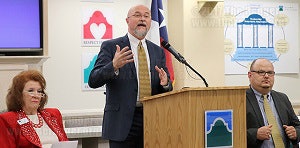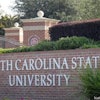After a series of polarizing flyers galvanized colleges and universities across San Antonio, Dr. Ric N. Baser penned an op-ed piece in his role as president of the Higher Education Council of San Antonio in which he argued that hate speech has no role on college campuses.
“American colleges and universities have always embraced diverse points of view, leading to a multitude of new discoveries and cultural understanding. Higher education is a phenomenal place for minds to be challenged, to inquire, explore, discover and question the status quo,” Baser wrote in an opinion piece that was published last December in the San Antonio Express News. “But from time to time, American colleges and universities witness hate speech or activity disguised as free speech. Such has been the case in recent weeks at several colleges and universities in San Antonio and throughout Texas.”
 Dr. Ric Baser, Northwest Vista College president, addressing students and community stakeholders.
Dr. Ric Baser, Northwest Vista College president, addressing students and community stakeholders.After the article was published, Baser – who is also president of Northwest Vista College – was the target of criticism, even appearing on the right-wing Breitbart website, which tried, unsuccessfully, to accuse him of not supporting free speech.
“What we were willing to say was that we were going to espouse the benefits of diversity on our campuses,” says Baser, adding that there were attempts to promote racial animus by individuals unaffiliated with the college community. “It did not come from internal. We are a diverse institution, where diversity is the basis of who we are and why we are so successful.”
Indeed, Baser has not been afraid to champion diversity causes and has spent his almost four decades in higher education doing so.
A seasoned administrator who took the helm in 2015 of Northwest Vista College (NVC) – part of the Alamo Community College system – Baser has moved through the ranks of higher education as a speech professor, vice president for student affairs, vice president and chief academic officer and now college president.
Now, as the leader of the college that boasts 18,000 students, Baser – the son of a preacher – has made diversity a top priority.
“Both our student enrollment population and our employees reflect the local demographics of our community,” says Baser in
an interview with Diverse. “We felt it very important that all of our students get to see themselves in our staff and faculty and have those role models. We’ve made a conscious effort to really change that.”
Several years ago, the number of students of color was less than 40 percent. But today, the number of students of color attending the college is about 76 percent.
But just recruiting the students to the two-year college is not enough, says Baser.
“We’ve done the same thing on the success side, drilling down on our demographics to make sure that we close those equity gaps,” says Baser. “We’ve focused on those disaggregated performance indicators and we’ve been able to move the needle overall as well.”
The numbers are impressive. Over a relatively short period of time, NVC has improved its graduation rate from 11 percent in 2010 to 29.4 percent this year. The numbers are still too low for Baser, but the pathway to advancement is sometimes slow.
But as the president, Baser says that his job is to inspire his staff to push forward.
“We really recognize the talent that we have on campus, empowering those folks where you can truly say you have a lawyer in every seat,” says Baser. “Where you have everyone knowing their opinions will be respected.”
Every month, Baser holds a Friday morning breakfast on campus, drawing several hundred students, faculty and staff together to honor individual success.
“We recognize everyone’s role,” says Baser, adding that the college has adopted The 4 Disciplines of Execution book developed by Franklin Covey, an international firm aimed at helping organizations achieve results that require lasting changes in human behavior. “We’re all pulling together so we all celebrate together.”
Baser says that, when he arrived to NVC, he inherited a campus that was already used to working together.
“We started with what we called ‘Touchstones,’ our values on campus and we operate through those,” he says. “My job is to really focus our vision on something that is actually outcomes-related. I have a wonderful job of being a great cheerleader for a phenomenally functioning organization.”
He says that NVC is the most collaborative institution he has ever worked at in his 37 years in the profession.
The pathway to the presidency
By his own account, Baser was never supposed to be a college president.
“I’m the guy who never intended to be where I am,” says Baser with a laugh.
He was an undergraduate theater major in college. A first-generation student, he earned a master’s degree at Oklahoma State University and worked in higher education, first coaching the debate team at Coffeyville Community College in Kansas and later transitioning to teaching at community colleges in Oklahoma.
He did that until a mentor cornered him and suggested, quite firmly, that Baser return to college to earn his doctorate.
After earning his doctorate from Oklahoma State University in 1992, he began his first vice presidency four years later at Seminole State College and then transitioned into a similar position at Rose State College and then Tulsa Community College.
Born in Sacramento, Baser was deeply influenced by his father who was the pastor of a community church that was multiracial with a number of denominations.
“My attitude and philosophy are largely guided by him,” says Baser, adding that the church helped him to develop an early embrace of diversity and has guided the work that he continues to do at the college.
“Diversity has really become our battle cry,” he says. “Our goal is to become the best transfer and workforce institution in the United States.”
Now, Baser has been intentional of mentoring the next generation of young scholars who have ambitions of becoming community college leaders.
“If higher education is going to survive and really have a diverse leadership that it really needs, we have to do a lot of cultivation,” says Baser, noting that he mentors many individuals who applied for a job to work with him and did not get the job.
Even still, he says he “saw something in them that they really needed someone to be there to listen and to be a sounding board.”
When he arrived at the college three years ago, he was told that the college was one of the nation’s best-kept secrets.
“My answer was that in three years if we are still the best kept secret, I should be fired,” he says, adding that the institution has been able to make inroads with Hispanic students, improving outcomes for this cohort. “We are very proud of what we do and I owe it all to a very collaborative faculty and staff who really make this thing work.”
This article appears in the May 17 issue of Diverse magazine.















